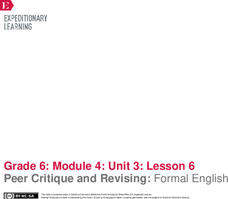EngageNY
Peer Critique and Revising: Formal English
Dear Sir or Madam: What's the difference between formal and informal language? Scholars focus on using formal English and transitions in their position papers. After revising their rough drafts, they engage in the peer editing process...
Beacon Learning Center
Beacon Lesson Plan Library: Formal or Informal?
Start talking trash with your elementary English class! Then lead a discussion comparing formal and informal language. Divide the class into groups to answer a questionnaire and analyze a set of sentence cards to analyze. This is a cool...
Curated OER
Writing for Different Audiences: A Discussion of Cover Letters And Resumes
Students examine the process of writing a resume. They identify examples of casual and formal language, read an article on writing resumes, discuss key questions, write a resume, and discuss and edit another student's resume.
Curated OER
Tu o Usted? Explanation and Worksheet 1
What is the difference between using tú or usted? This activity provides a thorough, clear explanation, and there's an opportunity to practice. The exercise lists different people and asks the learner to identify whether the informal or...
Curated OER
Using the Commentaries in Class
Young scholars examine language and communication by listening to a commentary radio show. For this communications lesson, students listen to Michael Josephson's radio broadcast using the Internet and analyze his words and their...
Curated OER
What Are Your Human Rights?: Post World War II and Human Rights
High schoolers define and discuss human rights, make lists of human rights they think everyone deserves, and create class list of ten most important rights. Students then translate formal language of Universal Declaration of Human...
Curated OER
My Spelling Words: Spelling List #86
In this spelling worksheet, 2nd graders will practice reading and writing 12 words such as casual and bitter. Then students will write the spelling words as pairs of opposites.
Curated OER
¿Tú o Usted?
In English, we only have one word that means you, but in Spanish, speakers can use either tú or usted. Print this sheet for your beginning speakers to introduce them to this idea. First, read through the information provided, and then...
Curated OER
Sentence Completion 8
Review context clues with your young readers using this helpful resource. Eight questions contain a missing word that pupils choose out of five options. The sentences provide ample context clues, making the choice more about test-taking...
Curated OER
Sentence Completion 6
Your class must use the subtle clues in each sentence to select the word that best fits in each blank. While multiple options are present, the correct answer is not impossible to find. Use this for some test prep before state testing!
Clever Student Training Company
Logical Fallacies Recognition
“Should same-sex marriage be allowed?” As part of a study of recognizing logical fallacies learners read John Stemberger’s April 12, 2012 argument against same-sex marriage published on the opinion page of the Orlando Sentinel. They then...
Curated OER
Good and Bad Emails
In this ESL worksheet, students read good and bad examples of formal and casual emails. Students cut apart emails into strips and assemble them. There are no logical directions for what to do on these five pages.
Curated OER
Clothes Cloze
In this clothing cloze activity worksheet, students read a 5 paragraph selection and fill in the blanks in the piece with words from the provided word bank.
Curated OER
Opposites
For this opposites worksheet, learners choose the word that is the opposite of the word given. Students complete 10 multiple choice questions.
Curated OER
Clothing crossword
In this clothing activity, students fill in a crossword that gives them clues about different kinds of clothing. Students solve 55 clues for the crossword.
Curated OER
Antonym Search
In this antonyms worksheet, students read 8 sentences that contain antonym pairs. Students identify the pairs and circle the antonyms.
Curated OER
Author’s Purpose
For this literary elements worksheet, students respond to 18 short answer and multiple choice questions regarding the author's purpose in "A World Made Beautiful by Dzine."
Curated OER
Dialect Awareness in Literature and Life
Eighth graders realize the impact of dialect in literature as well as their own speaking and writing by reading selections from Frances O'Roark Dowell's novel, Dovey Cove.
Curated OER
Kissing Coyotes
Fourth graders are read the book "Kissing Coyotes". During the story, they make predictions about what they believe might happen next. After the story, they create their own story using their imagination and draw illustrations.
Curated OER
Getting Dressed For Success
Learners in an ESL classroom describe and identify different clothing items. In groups, they compare and contrast the various clothing tradtions found in each home country. They discuss the importance of clothing and how they should...
Curated OER
Breaking News English: Woman Fired for Using Capital Letters
In this English worksheet, students read "Woman Fired for Using Capital Letters," and then respond to 1 essay, 47 fill in the blank, 7 short answer, 20 matching, and 8 true or false questions about the selection.






















